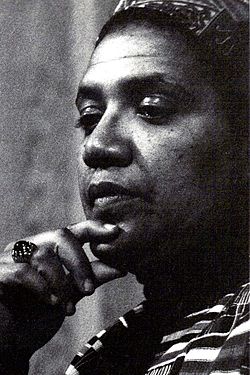Audre Lorde Quote
As Black people, if there is one thing we can learn from the 60s, it is how infinitely complex any move for liberation must be. For we must move against not only those forces which dehumanize us from the outside, but also against those oppressive values which we have been forced to take into ourselves. Through examining the combination of our triumphs and errors, we can examine the dangers of an incomplete vision. Not to condemn that vision but to alter it, construct templates for possible futures, and focus our rage for change upon our enemies rather than upon each other.
Audre Lorde
As Black people, if there is one thing we can learn from the 60s, it is how infinitely complex any move for liberation must be. For we must move against not only those forces which dehumanize us from the outside, but also against those oppressive values which we have been forced to take into ourselves. Through examining the combination of our triumphs and errors, we can examine the dangers of an incomplete vision. Not to condemn that vision but to alter it, construct templates for possible futures, and focus our rage for change upon our enemies rather than upon each other.
Related Quotes
About Audre Lorde
Audre Lorde ( AW-dree LORD; born Audrey Geraldine Lorde; February 18, 1934 – November 17, 1992) was an American writer, professor, philosopher, intersectional feminist, poet and civil rights activist. She was a self-described "Black, lesbian, feminist, socialist, mother, warrior, poet" who dedicated her life and talents to confronting different forms of injustice, as she believed there could be "no hierarchy of oppressions" among "those who share the goals of liberation and a workable future for our children."
As a poet, she is well known for technical mastery and emotional expression, as well as her poems that express anger and outrage at civil and social injustices she observed throughout her life. She was the recipient of national and international awards and the founding member of Kitchen Table: Women of Color Press. As a spoken word artist, her delivery has been called powerful, melodic, and intense by the Poetry Foundation. Her poems and prose largely deal with issues related to civil rights, feminism, lesbianism, illness, disability, and the exploration of Black female identity.
As a poet, she is well known for technical mastery and emotional expression, as well as her poems that express anger and outrage at civil and social injustices she observed throughout her life. She was the recipient of national and international awards and the founding member of Kitchen Table: Women of Color Press. As a spoken word artist, her delivery has been called powerful, melodic, and intense by the Poetry Foundation. Her poems and prose largely deal with issues related to civil rights, feminism, lesbianism, illness, disability, and the exploration of Black female identity.
